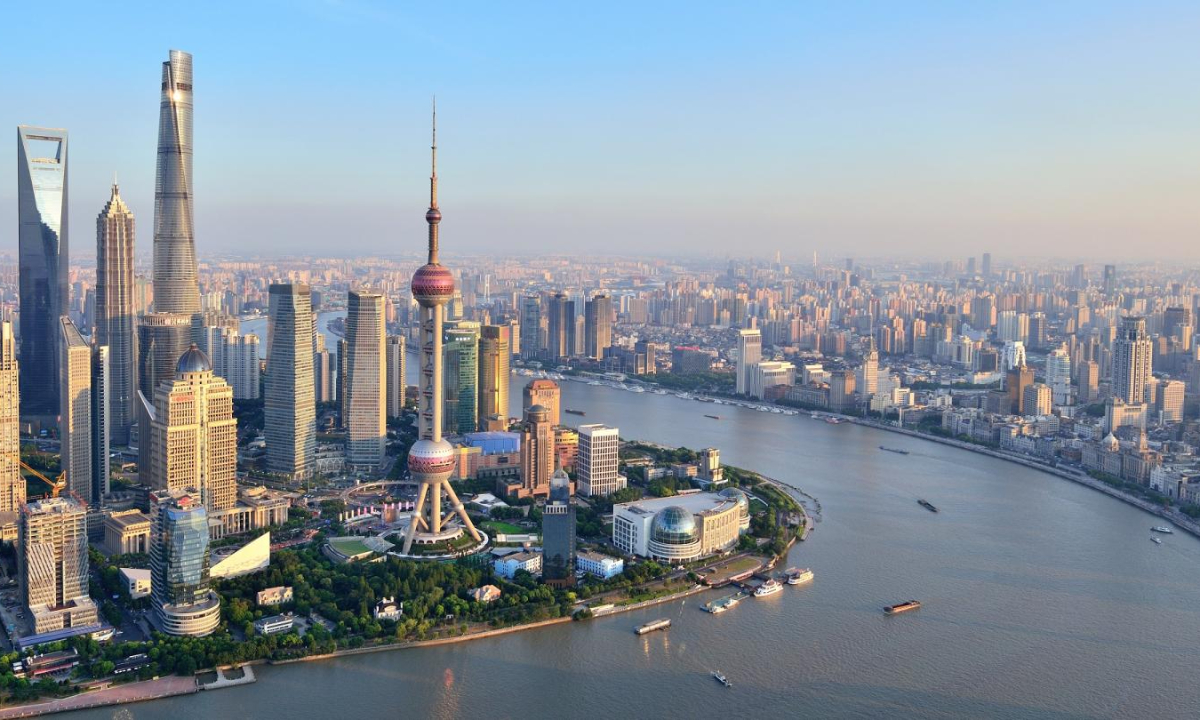China pilots measures aligned with high-level global trade rules in FTZs, in firm effort to advance opening-up
Move demonstrates nation’s push for higher opening-up, paves way for joining CPTPP: observers

Lujiazui area in Shanghai Photo:Xinhua
China's State Council has issued a set of measures which will be introduced on a trial basis in the country's free trade pilot zones and free trade ports, a move aimed at deepening reforms in key areas by aligning with high-standard international economic and trade rules, actively promoting institutional innovation, and exploring paths for achieving a higher level of opening-up.
Observers noted that the launch of the measures signals China is advancing the institutional opening-up in a sound and stable manner, despite calls for protectionism in some countries, and paving the way for joining high-level international agreements such as the Comprehensive and Progressive Agreement for Trans-Pacific Partnership (CPTPP).
The measures encompass various aspects such as promoting innovative development in goods trade, facilitating trade in services, streamlining temporary entry of business personnel, ensuring the healthy development of digital trade, optimizing the business environment, as well as establishing robust risk prevention and control mechanisms.
In particular, measures will be implemented to further promote goods trade, including pilot projects for importing remanufactured products in key industries, duty exemption for aircraft and vessels after being repaired in the Hainan Free Trade Port, and temporary tariff and tax waivers for specific imported goods.
Efforts are also underway to promote the liberalization and facilitation of trade in services, such as streamlined decision-making processes for financial institutions to provide services, and approval for foreign financial institutions to offer new services similar to those offered by their domestic peers.
Temporary entry of business personnel will also be eased, including granting accompanying spouses and family members of foreign experts the same entry and temporary stay period.
Allowing foreign experts' family members to enjoy equal treatment signifies an improvement in the business environment, providing reassurance to foreign businesspeople investing and working in China. Exempting customs duties on aircraft and vessels after repairs also relaxes entry and exit conditions, Dong Shaopeng, a senior research fellow at the Chongyang Institute for Financial Studies at the Renmin University of China, told the Global Times on Thursday.
These measures will be first piloted in Beijing, Shanghai, South China's Guangdong Province, North China's Tianjin Municipality, East China's Fujian Province, and other eligible free trade pilot zones, as well as the Hainan Free Trade Port.
It is expected that the measures will be rolled out in other areas nationwide in the future, Dong said.
Tian Yun, an independent macro analyst, said that the timing of the measures, which come following Vice Minister of Commerce Wang Shouwen's statement that China has the capability to join the CPTPP, indicates it's also possible that these rules are intended to pave the way for China's participation in the CPTPP.
On June 18, Wang said during the APEC China CEO Forum 2023 that China is sorting out reform measures and amending regulations and laws for joining the CPTPP.
Wang said that China has taken the initiative to meet the high operational standards of the CPTPP and implemented pilot reforms and opening-up in related fields.
"China has the willingness and capability to join the CPTPP, and meet its high standard, which will bring benefit to all members and further facilitate the free trade and investment in the Asia-Pacific region," he said.
While there may be certain challenges in future high-quality cooperation with all CPTPP member countries, it is possible to initiate free trade cooperation with some member countries, Tian told the Global Times on Thursday.
The CPTPP, in its current form, would generate global income gains estimated at $147 billion annually. If China were to join, the gains would quadruple to $632 billion, or one-quarter more than the original TPP with the US, according to a report by the Peterson Institute for International Economics.
Coming as some nations have been advocating protectionism, Tian said these measures also clearly demonstrate China's determination to oppose decoupling and support globalization.
According to data released by China's Ministry of Commerce on Thursday, China's foreign direct investment in the first five months had reached 574.81 billion yuan (84.35 billion yuan), up 0.1 percent year-on-year.
According to the newly released measures, China will also establish and improve risk prevention and control mechanisms. This includes establishing a system for identifying major risks and preventing systemic risks, enhancing safety assessment mechanisms, strengthening risk prevention and resolution, and implementing risk prevention and control responsibilities.

